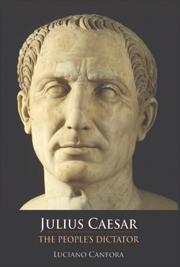Book contents
- Frontmatter
- Contents
- Translators' Note
- Acknowledgements
- Foreword
- PART I FROM SULLA TO CATILINE
- 1 In Flight from Sulla: First Experiences of an Aristocratic Youth
- 2 Prisoner of the Pirates (75–74 BC)
- 3 The Rise of a Party Leader
- 4 Pontifex Maximus
- 5 The ‘Affairs’ of Mr Julius Caesar and Others
- 6 The Political Market
- 7 Inside and Outside the Conspiracy
- 8 Caesar's Senate Speech Rewritten by Sallust
- PART II FROM THE TRIUMVIRATE TO THE CONQUEST OF GAUL
- PART III THE LONG CIVIL WAR
- PART IV FROM THE CONSPIRACY TO THE TRIUMPH OF CAESARISM
- Chronology
- Bibliography
- Index
6 - The Political Market
from PART I - FROM SULLA TO CATILINE
Published online by Cambridge University Press: 05 August 2013
- Frontmatter
- Contents
- Translators' Note
- Acknowledgements
- Foreword
- PART I FROM SULLA TO CATILINE
- 1 In Flight from Sulla: First Experiences of an Aristocratic Youth
- 2 Prisoner of the Pirates (75–74 BC)
- 3 The Rise of a Party Leader
- 4 Pontifex Maximus
- 5 The ‘Affairs’ of Mr Julius Caesar and Others
- 6 The Political Market
- 7 Inside and Outside the Conspiracy
- 8 Caesar's Senate Speech Rewritten by Sallust
- PART II FROM THE TRIUMVIRATE TO THE CONQUEST OF GAUL
- PART III THE LONG CIVIL WAR
- PART IV FROM THE CONSPIRACY TO THE TRIUMPH OF CAESARISM
- Chronology
- Bibliography
- Index
Summary
The trade in votes, which celebrated its greatest triumphs in Roman election campaigns, is eloquent testimony to the well-known fact that only members of the wealthiest families could contemplate and pursue a career in politics. The Roman republic was, as we know, an oligarchic republic in the sense that all its leading political figures were drawn from a patrician-plebeian nobilitas characterised by being able to boast that its forebears had reached the rank of consul (the highest political and military office). It was an oligarchy which sought and directed the ‘popular’ vote in order to perpetuate itself, but it did not systematically exclude all contributions from other family groups (some of whom came from the Italic ruling strata after the ‘Social War’). The homines novi were able, with commitment and determination, to forge a career, but to do so they had not only to come from rich families (to afford to enter politics), but also to have the ability to form connections, at least in the preliminary stages, with the great and powerful families of the day. We need look no further than Marcus Tullius Cicero, perhaps the most famous of the homines novi in the late Roman republic, and his entry into politics (and his subsequent career). A homo novus, especially if he had money and training in oratory and the law, might be co-opted.
- Type
- Chapter
- Information
- Julius CaesarThe People's Dictator, pp. 33 - 38Publisher: Edinburgh University PressPrint publication year: 2007



